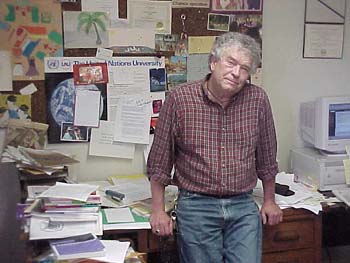Dr. Thomas Bruneau
B.S.
University of Wisconsin.
M.S. University
of Wisconsin
Ph.D. Pennsylvania
State University
CONTACT
200 Jefferson St.
Room.7B
Phone: (540) 831-5700
E-mail: tbruneau@radford.edu

Dr. Bruneau is
Professor of Communication. His work concerns theory-building in several
interrelated areas of study including
nonverbal communication, intrapersonal communication, and
intercultural communication. In terms of these areas of study, Dr. Bruneau's
present focus is on the concepts and processes of silence, time,
empathy, and notions of self. Along
with Interpersonal Communication, he also teaches Teamwork and
Communication, Listening and Nonverbal Communication, and Gender
Communication.
Q:
Let us start with you telling us briefly about the courses you
teach.
A:
The first course is
Intercultural Communication which involves understanding communication
across social differences. It deals with appreciating cultural
differences, various age groups, and understanding the different types
of communication between normal and disabled people.
The class on Teamwork is focused on learning to work with people
in a team—to solve
problems, meet goals collectively.
The class on Gender communication involves communicating across
gender differences. It could be male-to-male, female-to-female,
male-to-female and also gay and straight relationships.
The Listening and Nonverbal class is about human reception,
trying to find out how people process information. It deals with the
brain and how it codes and decodes messages. It involves various types
of listening. The
Interpersonal class revolves around three topics—loneliness,
friendship and intimate/ romantic relationships—and the
function of communication in all three.
Q:
What is your approach to these courses?
A:
In all my classes I try to give the broad picture, the global
perspective of these areas of study. I try to teach these courses from
the multicultural perspective—different people from different
backgrounds and how they would respond to communication. Students in my
classes put together projects on many of these topics, and they get
practical experience in how these things occur in everyday life. In my
classes I emphasize leadership, which helps students once they move out
into the professional world.
Q:
What kind of academic background do you think is best suited for
these courses?
A:
These courses teach things that are applicable to all walks
of life. I prefer students who are intelligent and have an interest in
the area of communication.
Q:
In what ways can students put these courses to use once they
graduate?
A:
I teach people about the depth and scope of our ignorance. I
teach for life, the whole life, from birth to the grave. So the scope of
these courses is never ending; the concepts are applicable
everywhere—in professional
as well as personal life.
Q:
What would be your advice to prospective or new students?
A:
Don’t fool yourself; the real world is here. If you study
eight to twelve hours a day, you will be prepared for your future jobs.
Jobs will be fewer in the future; be prepared to compete or else end up
cooking for Burger King!
|